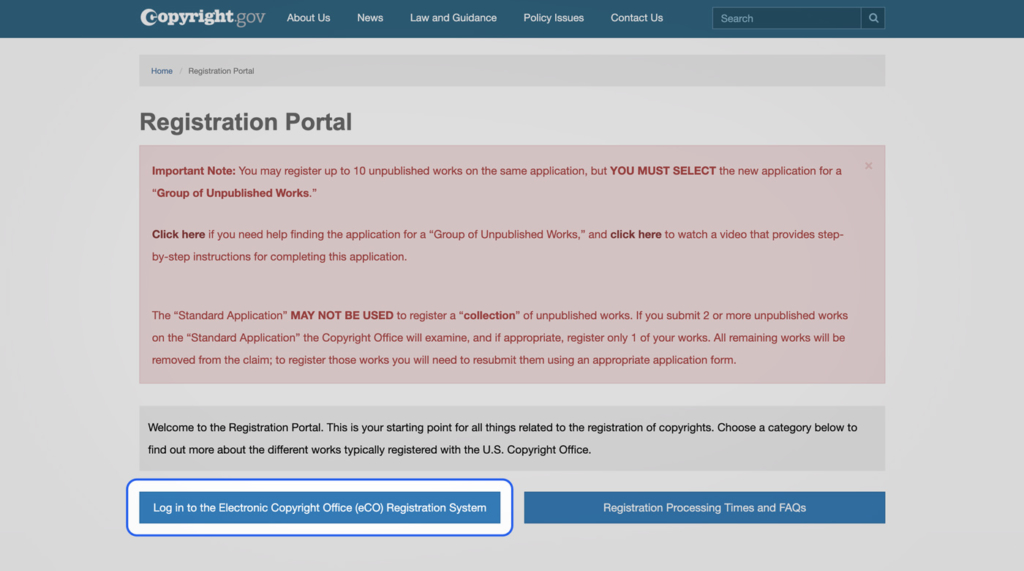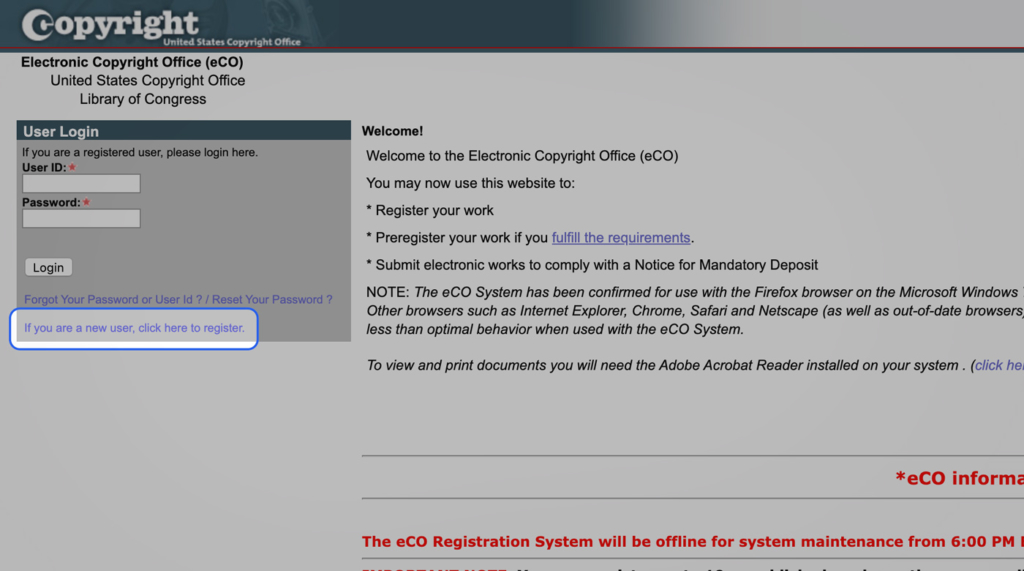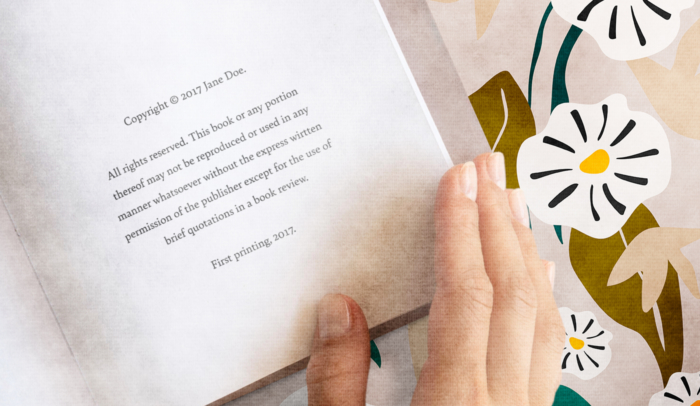Some Authors want to know how to “copyright” their self-published book.
Chances are you’ve put a ton of time and hard work into your book. So it makes sense that you’d want to protect your exclusive rights as an Author with legal protection.
That’s why I’ve put together this post—to walk you step-by-step through the entire copyright process.
But before I get into the details of exactly how to copyright your book, let’s talk for a second about what “copyrighting” your book means and whether it’s even worth doing.
When people ask how to copyright a book in the United States, what they’re really asking is how to register their book with the U.S. Copyright Office.
There’s a big difference.
Why?
Because even if you don’t register the copyright, you’re already protected by U.S. copyright law.
In the United States, the moment you publish anything original, whether on paper or on a computer, your work is protected by copyright.
So why do people still bother to register their books with the Copyright Office?
- To put the facts of the copyright in the public record.
- To get a copyright certificate with the date of registration.
- So they can more easily sue other people for copyright infringement.
- To have a better chance of winning statutory damages and attorney’s fees in a lawsuit.
Basically, it helps you if you ever need to go to court to protect your own copyright. It’s NOT required, it just helps out.
That said, it’s relatively easy to copyright a book. It can be done online in 30 minutes or less if you’ve gathered the information you need, and it only costs $35 – $55 for most Authors.
So, if you want to know how to copyright your book, here’s how to do it.
9 Simple Steps to Copyright a Book
Step 1. Visit the U.S. Copyright Office online

The website of the United States Copyright Office is clunky as hell once you get into the registration section, but it works.
To create a free account so you can use the system, visit this page, look for the two buttons in blue, and choose “Log in to the Electronic Copyright Office (eCO) Registration System.”
Step 2. Create your free account

In the gray box, click the choice at the bottom that says: “If you are a new user, click here to register.” Follow the instructions to create your account.
Step 3. Start a new copyright registration
To begin a new copyright registration, you’ll have to choose a path.
The two most common choices for books are “Register One Work by One Author” (a $35 fee) and “Standard Application” (a $55 fee).
Disclaimer: I’m not your attorney, so I can’t tell you step-by-step exactly what to do for your book. I’ll cover the basics, but if you want specific help walking through this legal form, hire an intellectual property attorney.
Step 4. Enter the info screen by screen
The system will walk you through the process. Fortunately, it’s pretty self-explanatory, but here are a few tips:
- Print and ebooks are literary works
- You are the claimant and the copyright owner; it’s your book
- The publication date is whatever you listed on Amazon
- You’ll have to send in (or upload) the best available edition
Step 5. Review your submission
The system will give you a final chance to review everything you entered before you submit your registration form, so be sure to check everything carefully.
Step 6. Pay the filing fee
You can pay this fee online with a credit card. For most Authors, the electronic filing fee will be either $35 or $55, depending on the details of the registration.
Step 7. Send in the required copies
If your book was only published as an eBook, you can upload a digital copy as the best available edition.
If you published print editions, send two copies of the hardcover, or send the paperback if there’s no hardcover edition.
Note that if you received a control number from the Library of Congress, you’ll have to send separate copies for that. The copies you send to the U.S. Copyright Office for copyright registration are different.
Step 8. Get your copyright registration in the mail
Assuming all goes well, you’ll get a copyright registration certificate in the mail several months after you complete your copyright application.
If there are any issues with your online registration, the Copyright Office will email you.
Step 9: Add a Copyright Notice
A published copyrighted work needs to have a copyright notice. There are three requirements to a copyright notice:
- The copyright symbol ©, (c), “Copyright,” or “Copr”
- Year of first publication (and year of newest publication, if different)
- Author’s name (can be a pen name)
You can add your contact information, or the publisher’s contact information, near your copyright notice so people who would like to get your permission to use your work can reach you.
Copyright FAQs
Do I need a copyright attorney to register my book?
No. There’s no law that says you have to use an intellectual property attorney to register your own book, and many self-published Authors register their own works.
But if you have questions, always consult an attorney—especially if you’re not sure whether you have the right to use certain material in your book or if you or your book is in some unique situation.
Please don’t listen to me. I went to law school, but I never took the bar, am not registered to practice law in your jurisdiction, and really, you shouldn’t even hire me to do it if I were.
What’s the best time to register my book with the copyright office?
It’s never too late to register your book with the U.S. Copyright Office, but you get some extra benefits for registering early in the publishing process.
If you register within three months after the publication date, you can be eligible for statutory damages, attorneys’ fees, and costs if you ever file a copyright claim in court.
If you register within 5 years after the publication date, the court will give more weight to the facts listed in your registration.
What counts as the publication date?
Basically, the first day you make your book available to the public counts as the publication date.
If you post your book on your website for free, that’s still publication, but the law always struggles to keep up with new situations and new media. If you’re not sure, register sooner rather than later.
Can I publish my book with a copyright page before I register my copyright?
Yes, and you should.
Most Authors publish before they register the book, and the book should always have a copyright page that includes your copyright notice, even if you don’t intend to register the copyright.
Key Copyright Terms
Intellectual Property
Intellectual property law encompasses copyrights, trademarks, and patents. The term was coined to express the legal concept that people can own the product of their creativity and invention. But you can’t own an idea. You can only own the product of your ideas—it has to be in some “tangible form.”
For example, you can’t own an idea for a book, but you can own the book you wrote. Malcolm Gladwell can stop people from copying his book Blink, but he can’t stop people from writing nonfiction works about the unconscious mind.
Like any other property, intellectual property rights can be transferred, negotiated, and sold. In self-publishing, you keep your rights. In traditional publishing, you transfer a large portion of your rights away. You can read more about those differences in my post that compares the two publishing options.
Copyright Protection
Copyright protection is just what it sounds like—it protects your rights as an Author in your creative work from people who might otherwise attempt to steal or unfairly use your content.
You’re protected for your original work, meaning the part of the book that originated with you, and you have the right to protect that copyrighted work (and reap the financial benefits) as the copyright holder.
Copyright Infringement
Copyright infringement is when someone else tries to use, publish, or otherwise steal your work.
People can buy a copy of your book and then give it to someone else, but they can’t copy your work and sell it or give it away.
The law can be complex about where the line is when it comes to infringement, but the idea is to protect Authors against a potential loss of sales.
Remember: you don’t have to register a literary work (the copyright term for a book). It’s protected by copyright the moment you publish it. Registration just makes things easier if you ever have to try to protect it in court.
Original Work
Your original work is what you wrote—or, in some cases, what someone else wrote for you. That sounds straightforward, but it isn’t always.
For example, public data is not original work, and it can’t be copyrighted. But if you write a paragraph about that public data, the words of your paragraph are still copyrighted. The protection covers your specific words as original work without stopping other people from using the same public data.
The legal concept of original work tries to draw a fair line between what should be protected, because you came up with it, and what shouldn’t, because you didn’t.
Fair Use
Even when you write an original work that’s protected by U.S. Copyright Law, other people still have the right to use small pieces of it under certain circumstances. This includes things like reviews, media commentary, and some educational purposes.
For example, generally speaking, if a person quotes you in a work they do not need to obtain your permission to do so if they credit you (or the author of the quote) accordingly.
This is known as “fair use.” It carves small pieces out of an Author’s copyright protection in favor of public benefits—like our First Amendment protections of freedom of speech and freedom of the press.
It’s one of the most unpredictable areas of the law when it comes to court cases, so if you have any doubt about where your rights end and someone else’s begin, ask an attorney.
That said, I’ve written another post to give you some basic guidelines about using other people’s work, such as songs or short excerpts.
Libel
That brings me to my final point about copyright. Writing something original doesn’t automatically give you the right to publish it.
While most writing is protected by a combination of copyright and the First Amendment, you can still run into trouble if you publish something that is falsely negative about someone else.
Defaming someone in print is known as libel, and it can have serious consequences. Now, it has to be falsely negative to be libel. If you’re writing the truth, you’re protected, no matter how bad that truth is. But be prepared to prove it.
Bottom Line
Here’s the bottom line: if you wrote a book, you were protected by copyright the moment those words were written.
If you published the book, you can choose to register it with the U.S. Copyright Office for added benefits should anyone ever infringe on that copyright.
If your book includes excerpts that came from other sources, the original work in your book is still covered by copyright. Just make sure you have the right to include those excerpts so you aren’t infringing on someone else’s copyright protection.


